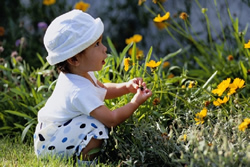Day 115, Chronological Bible Study Timeline. Map. Go to today’s Bible reading (use your browser arrow to return): 1Samuel 31; 1Chronicles 10; 2Samuel 4:4; 2Samuel 1
Tending Our Spiritual Gardens
In North America, spring’s a time for gardening. What are our favorite things to plant—flowers, potatoes, onions, tomatoes, peppers, or something else? After we carefully plant them, should we just leave them alone until harvest? What happens if we don’t clear all the weeds?
Jesus, like most Jews, lived in an agricultural area. While he taught, he used farming illustrations to make a central point. Jesus said in a parable, “The seed that fell among thorns stands for those who hear [God’s message], but as they go on their way they are choked by life’s worries, riches and pleasures, and they don’t mature,” (Luke 8:14, NIV).
What is true with physical gardens is true of the gardens of our hearts. God plants spiritual seeds in our gardens, but if we don’t tend them, the seeds will bear little or no fruit.
If we want spiritual growth, we should take care of our hearts like a garden. This means listening to God’s Word, applying it, and allowing ourselves to be pruned by our LORD. The mere reading of God’s Word isn’t enough.
Saul’s Seed
King Saul didn’t tend the garden of his spiritual life. He started well—he was humble and even reticent to take the nation’s leadership. After the people appointed Saul king, the Spirit of God led Saul and gave Israel immediate victories over her enemies. Afterward, he gave glory to God for the wins and resisted petty revenge. That was the seed.
Unfortunately, pride, power, and position choked out the spiritual fruit of his life. Then, he couldn’t grow in spiritual maturity or lead Israel as God desired. Because of his pride and disobedience, the LORD instructed Samuel to anoint David to replace him. David was a young man after God’s own heart. Whose heart do we follow—ours or God’s?
One of King Saul’s sins was failure to wipe out the Amalekites. He wanted the praise of his men and wealth more than obeying the LORD. Ironically, it may have been an Amalekite who finished him off when he was dying (2Samuel 1:6-10).
David’s Seed
The seed of David’s spiritual life also started with humble beginnings—he was a shepherd boy. Now, as a man, David seeks the help of the LORD his God. God is his refuge and strength. He grows in spiritual maturity because he keeps the weeds of pride, power, and position out of his life. He nurtures his relationship with the LORD, the giver of life and blessings.
God protects David in the wilderness from the murderous attempts of his jealous father-in-law, King Saul. Although pursued by him, David respects the LORD’s choice of Saul as his anointed and doesn’t kill him, even though he had two opportunities to do it. He doesn’t take revenge himself—he lets God handle it.
David is also God’s anointed, his chosen one to lead Israel. The Almighty blesses his military exploits and surrounds him with brave fighting men. He even protects this young warrior from an unwise alliance with the Philistines, which would have caused him to fight against his people.
When David returns to Ziklag with his men, they discover the Amalekites have taken advantage of their absence; they raided and burned the town while the Philistines and Israelites were engaged in battle. They carried away everything valuable and even their families.
Saul failed to remove the Amalekites, but David and his men now take revenge on them to rescue their families. God blesses his band of men, and they recover everyone and everything. Then they loot those who looted them, and they slaughter the Amalekites.
After his victory, David shows his spiritual maturity when he receives word of the death of Saul and his sons on the battlefield. He doesn’t rejoice at the demise of his enemy. David mourns the loss of the LORD’s first anointed one, King Saul. He composes a song in tribute to him and Jonathan (2 Samuel 1:19-27), and orders the men of Judah to learn this lament.How do we react when God’s spiritual leaders fall? Do we rejoice and seize opportunities for ourselves, or do we mourn?
David was a humble man. He never forgot his roots. He never staged a coup to dethrone Saul or his sons. David realized God could bring his kingdom when He wanted; the LORD didn’t need David’s help.
What weeds do we need to clear from our spiritual gardens? Are we eager to do what’s right and tend our gardens, or do we let the weeds of pride, position, or pleasure choke out any spiritual growth? If we tend our gardens, the LORD will make us fruitful in what we do. We will reap good from the good we sow.
Focus Verses
Galatians 6:7-8 (NIV)
Do not be deceived: God cannot be mocked. A man reaps what he sows. The one who sows to please his sinful nature, from that nature will reap destruction; the one who sows to please the Spirit, from the Spirit will reap eternal life.
Discussion
How was Saul’s seed different than David’s seed?
What weeds might come into the spiritual garden of our hearts?
How do we keep our garden well-tended?
Write a private prayer response to today’s Bible study:
Please send your comments to me, Rod
Looking Ahead: With the death of King Saul comes a power struggle for his kingdom. Find out how to Defuse Power Struggles in our Next Lesson.
Back to top of page
Go to Scriptures main page
Go to Topics main page
Go to Home pagepage last re-edited 5-22-2024
COPYRIGHT @ 2019, MASTER'S TOUCH BIBLE STUDIES

